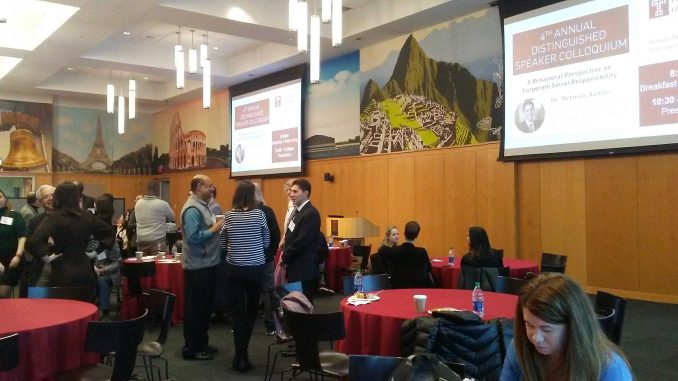
Herman Aguinis, a professor of management at the George Washington University School of Business, spoke about his Corporate Social Responsibility research, titled “A Behavioral Perspective on Corporate Social Responsibility,” at Alter Hall on Friday. The talk was part of the Department of Human Resource Management’s Fourth Annual Distinguished Speaker Colloquium.
Aguinis, the author of “Performance Management for Dummies,” explained that CSR relates to company policies used for cultivating meaningful relationships with employees and consumers. Roughly a hundred people from different universities and companies along the East Coast attended the event.
Examples of CSR include a company giving money to a local nonprofit, working on reducing a company’s environmental footprint or making sure there is equal representation across gender, race, and sexual orientation, according to The Balance.
Before the event, Aguinis said he hoped that students who came to the event would recognize the necessity of managing workers rather than just the organization: to see the value in emphasizing employee well-being in a corporate setting.
“It is important to work on research problems that can help society, that can help the wellbeing of individuals,” Aguinis said. “You gain meaningfulness through work through intra-organizational and intra-individual factors.”
Aguinis said that during his research, he found that there were very few studies on why CSR is effective. Leadership theories change all the time so it can be hard to determine what factors have the most positive effects on employees and the importance of CSR lies in how invested employees are in their company, he said.
“You don’t have to be a genius to be a top performer,” he said.
Depending on the company’s morals, values and actions, the employee can feel as if they are contributing to the greater good and a positive perception of a company’s CSR can boost employee dedication to their company, resulting in more business, Aguinis added.
Considering that the average employee spends one-third of their life at work, it is vital for workers to find meaning in their work: it can raise employee satisfaction while simultaneously benefiting the company, Aguinis said.
“Be very careful when looking for a company,” Aguinis said. “When workers’ values match with the values of the company, they are happier and more productive.”
Dr. Crystal Harold, an associate professor of human resource management, who organized the event, said she was delighted with the results.
“I am really pleased with the number of people who came out from other institutions and colleges. It was a very diverse crowd and it was nice to hear different perspectives,” Harold said.
Joe Kim, a human resource management and organizational behavior doctorate student, said that CSR is important and will have a positive impact on companies.
“It is good to see that the necessary research is being put into CSR,” Kim said.
So Young Choi, a first-year Organizational Behavior Psychology doctorate student at Drexel University, learned more about CSR from the event, she said.
“He gave me lots of good insight on how to get into CSR research,” Choi said.



Be the first to comment